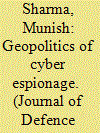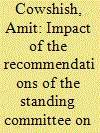| Srl | Item |
| 1 |
ID:
136776


|
|
|
|
|
| Summary/Abstract |
The nature of warfare has undergone a major change over the last few decades, brought about by rapid advancement in technologies combined with changes in doctrines and organisational concepts. This has resulted in enhanced focus on integrated and joint operations. Unified structures have been put in place by all major militaries in the world to optimise their defence capabilities. India appears to be reluctant to adapt wholeheartedly to the changing nature of war-fighting despite facing a wide variety of threats to its internal and external security. This article makes a case for establishing unified commands in India to enhance integration and jointness at the strategic and operational levels. In doing so, it examines various available models for implementation in the Indian context. Finally, it suggests a viable model for unified commands for India keeping in mind the geo-political realm and the external and internal threats to its security.
|
|
|
|
|
|
|
|
|
|
|
|
|
|
|
|
| 2 |
ID:
136778


|
|
|
|
|
| Summary/Abstract |
There is an intricate relationship between the methods of cyber espionage and the evolution of information and communications technology, of which information security is a key aspect. This article is an attempt to establish forward and backward linkages of cyber espionage. It examines the geopolitics, methods, role of information security technology and, most importantly, how the future of cyber espionage is being shaped by emerging technologies such as supercomputing, quantum computing and ‘big data’, from an Indian perspective.
|
|
|
|
|
|
|
|
|
|
|
|
|
|
|
|
| 3 |
ID:
136775


|
|
|
|
|
| Summary/Abstract |
The examination of the detailed demands for grant (DDGs) of the Ministry of Defence (MoD) by the Standing Committee on Defence of the 14th Lok Sabha (2004–05 to 2008–09) and recommendations made by the committee had little impact on the country’s defence budget. While the examination was generally perfunctory, the recommendations were either too general or too impractical to be implemented by MoD. This is the second of two articles that examines how the Standing Committee on Defence of the 15th Lok Sabha (2009–10 to 2013–14) followed the same pattern. Its examination was based on pre-conceived notions about the size of the defence budget and, similar to its predecessor, the recommendations were too general to make any impact on the trajectory of the defence budget.
|
|
|
|
|
|
|
|
|
|
|
|
|
|
|
|